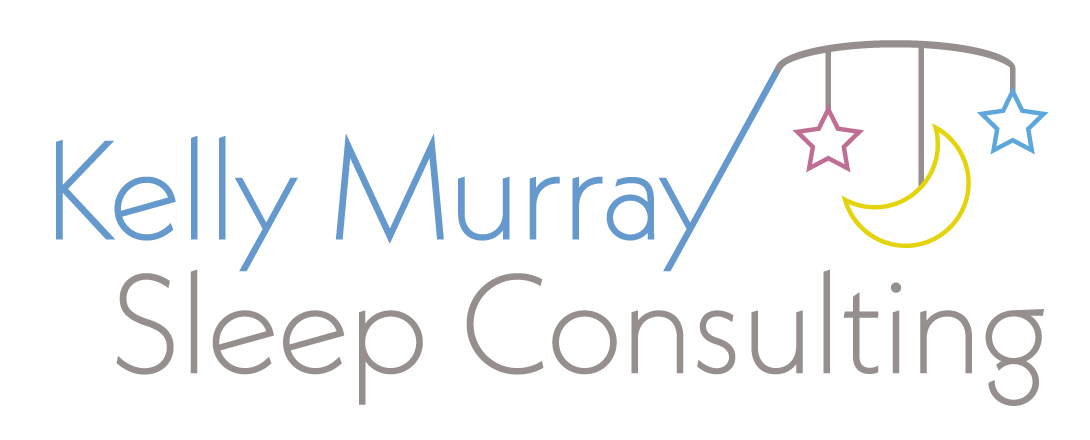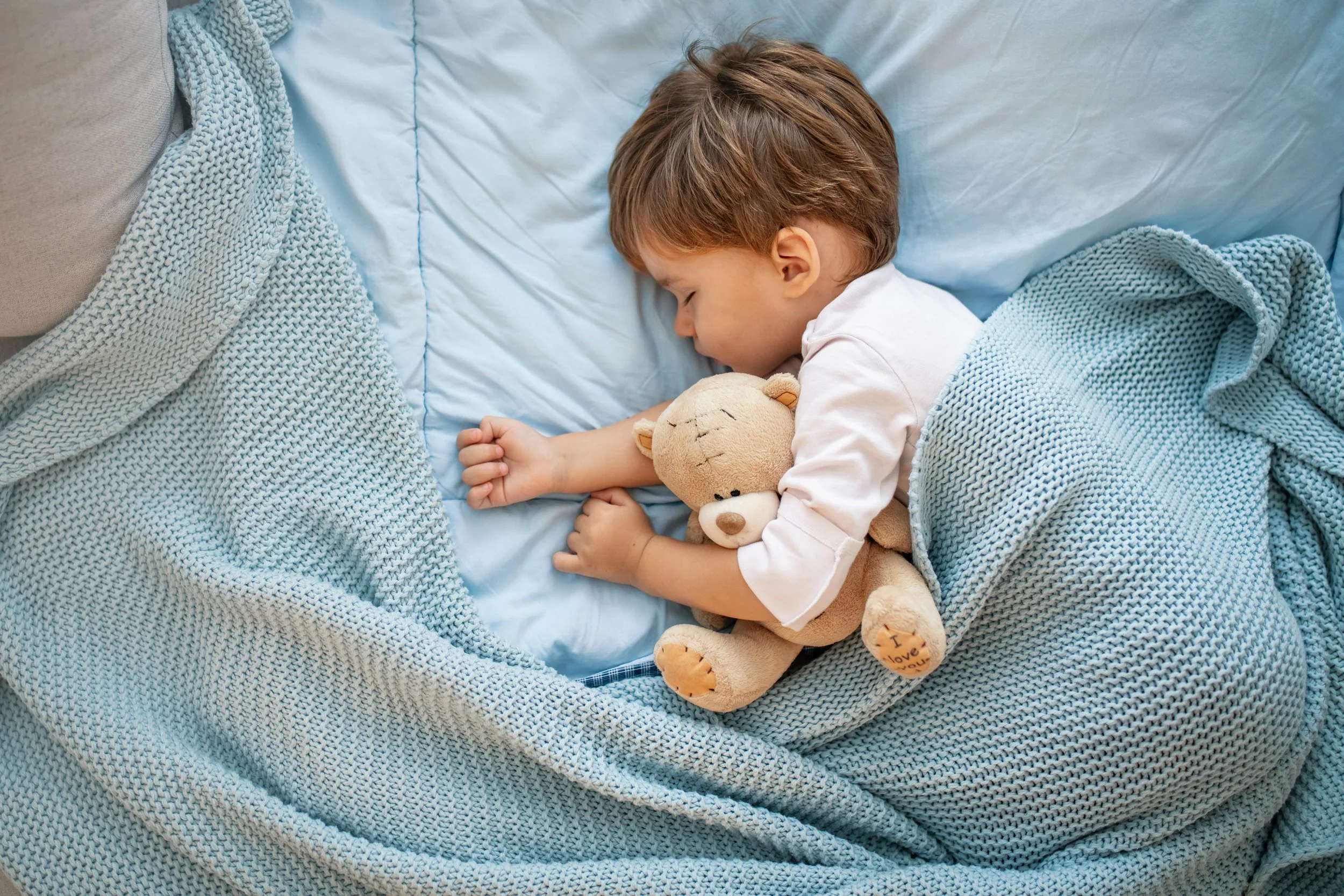Overcoming Guilt When Sleep Training
By : Natalie Myre Hart, SENIOR Sleep Consultant
I want to address a topic that's very close to my heart:
overcoming mom guilt when sleep training
As a mom myself, I know the struggles, the doubts, and the inner conflict that often come with sleep training. It's not easy, but I'm here to help you shift your mindset and see the bigger picture:
You're not just sleep training; you're giving your child the gift of independent sleep — a skill that will serve them for life.
Let’s dive into the emotional challenges of sleep training and explore how to work through the guilt.
What Is Mom Guilt, and Why Does It Happen During Sleep Training?
Mom guilt is that nagging voice in the back of your mind telling you, “You're doing this wrong!” It often surfaces when you're making decisions that you believe are in your child's best interest but still feel uncomfortable. During sleep training, this guilt can become particularly intense. Mom guilt might creep in when you find yourself asking:
"Am I being cruel for letting my baby cry?"
"Is this going to damage my child emotionally?"
"Why do I feel so torn when I know this is supposed to help them?"
These feelings are completely normal. In fact, most mothers feel this way during sleep training because it taps into our natural instincts to comfort and protect our babies. The idea of letting them cry — even for a short period — can feel counterintuitive to everything we know about being a nurturing parent.
(To read more about crying and how to not let it hold you back from sleep training, read this post→)
Shifting Your Mindset: Giving Your Baby a Gift
One of the most powerful ways to overcome mom guilt during sleep training is to shift your mindset. Instead of focusing on the discomfort in the moment, think about the long-term benefits you're providing to your child. You’re not depriving your baby of comfort; you’re empowering them with a life-long skill: independent sleep.
The Benefits of Independent Sleep
When your baby learns to fall asleep on their own, they are acquiring a skill that will serve them well beyond their infancy.
Independent sleep can help:
Improve Sleep Quality: Babies who can self-soothe tend to sleep more soundly and for longer stretches.
Promote Healthy Development: Quality sleep is vital for brain development, growth, and emotional regulation.
Help Through Challenges: Independent sleep skills can help your baby weather sleep regressions, teething, and even sickness with more ease.
By sleep training, you’re not only addressing the immediate issue of sleepless nights but also setting your child up for long-term success. That shift in perspective can help alleviate the guilt you may feel in the moment.
Sleep Training Isn’t About Crying, It’s About Learning
There’s a common misconception that sleep training is synonymous with letting your baby cry uncontrollably for long periods. But that's not what we teach in our method. Our approach is supportive, thoughtful, and takes into consideration your comfort level and your baby's unique needs.
Minimizing Crying: A Key Focus
Before we even start the sleep training process, we take a close look at four critical factors:
Environment: Is your baby's sleep space conducive to rest? Is it dark, quiet, and free from distractions?
Schedule: Is your baby's nap and nighttime schedule age-appropriate? Are they getting enough sleep during the day to support good nighttime rest? (For sample schedules for all ages, click here→)
Nutrition: Is your baby eating enough during the day to eliminate hunger as a reason for waking up at night?
Plan: We develop a plan together that feels right for your family. Whether you prefer to be right there in the room or use a more hands-off approach, we’ll work with you to create a strategy that minimizes distress for both you and your baby.
The Importance of a Customized Approach
Sleep training doesn’t have to be a one-size-fits-all experience. Every family is different, and every baby responds to different methods. That's why it's essential to create a sleep training plan that feels good to you. If staying in the room with your baby during sleep training is what makes you feel more comfortable, that’s okay! It's about finding what works for your family.
My Personal Experience Navigating Guilt and Finding Success
Let me share a bit of my own story. When I sleep-trained my son back in 2019, he was eight months old. Like many moms, I was terrified of the idea of letting him cry for even a few minutes. I would rush to pick him up at the first whimper. But eventually, I realized that what I was doing wasn’t helping him learn how to sleep on his own. I had to make a change, even though it felt so hard at first.
That first night of sleep training was tough. I sat by his crib and reassured him, even though I didn’t pick him up every time he fussed. I was there with him through it all, which made me feel like I was still nurturing him while teaching him this new skill.
Over time, the crying decreased, and within a few nights, he was falling asleep on his own.
It was a relief to see him sleep peacefully through the night.
What I Learned from Helping 120 Families
Since my own sleep training experience, I’ve had the privilege of helping over 120 families through their own sleep training journeys. And here’s what I’ve learned: the mindset behind sleep training is crucial. When you shift your focus from guilt to the long-term benefits, it becomes easier to stick with the process and see the positive outcomes.
Every family is different, but the common thread is that we’re all working towards helping our children develop the skill of independent sleep. That’s a gift that keeps on giving, long after the sleep training is done.
How We Support You Through the Process
One of the reasons sleep training can feel so daunting is that it’s hard to know if you’re doing it right. That’s why we’re here to guide you every step of the way. You don't have to navigate this journey alone — we'll be there to support you on night one, either virtually or in person.
Virtual and In-Person Support
Whether you need a consultant in the room with you or prefer virtual support, we’ll make sure you know exactly what to do and feel confident in your plan. Having a sleep consultant by your side helps reduce the overwhelm, ensures that you’re following the right steps, and provides the reassurance that you’re doing what’s best for your baby.
Letting Go of the Guilt: You Got This, Mama
I want to leave you with this: you are not alone in feeling guilty about sleep training. It’s a common and normal part of the process. But remember that you're making a decision that will ultimately benefit both you and your baby. By teaching your child how to sleep independently, you're helping them develop a skill that will promote their well-being for years to come.
Embrace the process, knowing that you’re giving your child a precious gift. Independent sleep is more than just a means to more restful nights; it’s a foundational skill that will support your child’s development and well-being throughout their life.
So, take a deep breath and trust yourself. You’re doing an amazing job. You’ve got this, mama. And we’re here to help you every step of the way.
If you feel like you could use more support, please give us a call. It’s free, and we can explain our approach so you can decide if we’re the right fit for you and your family.
All team members have completed training with Kelly and have learned the Murray Method. Kelly continues to support, guide and oversee the Sleep Squad as they work with the families who trust in us. This way, all clients are able to experience the same amazing results (and lots and lots of sleep).
Sweet Dreams…
Kelly Murray is a certified sleep coach and an award-winning pediatric sleep consultant based in Chicago offering sleep coaching services nationwide.

















